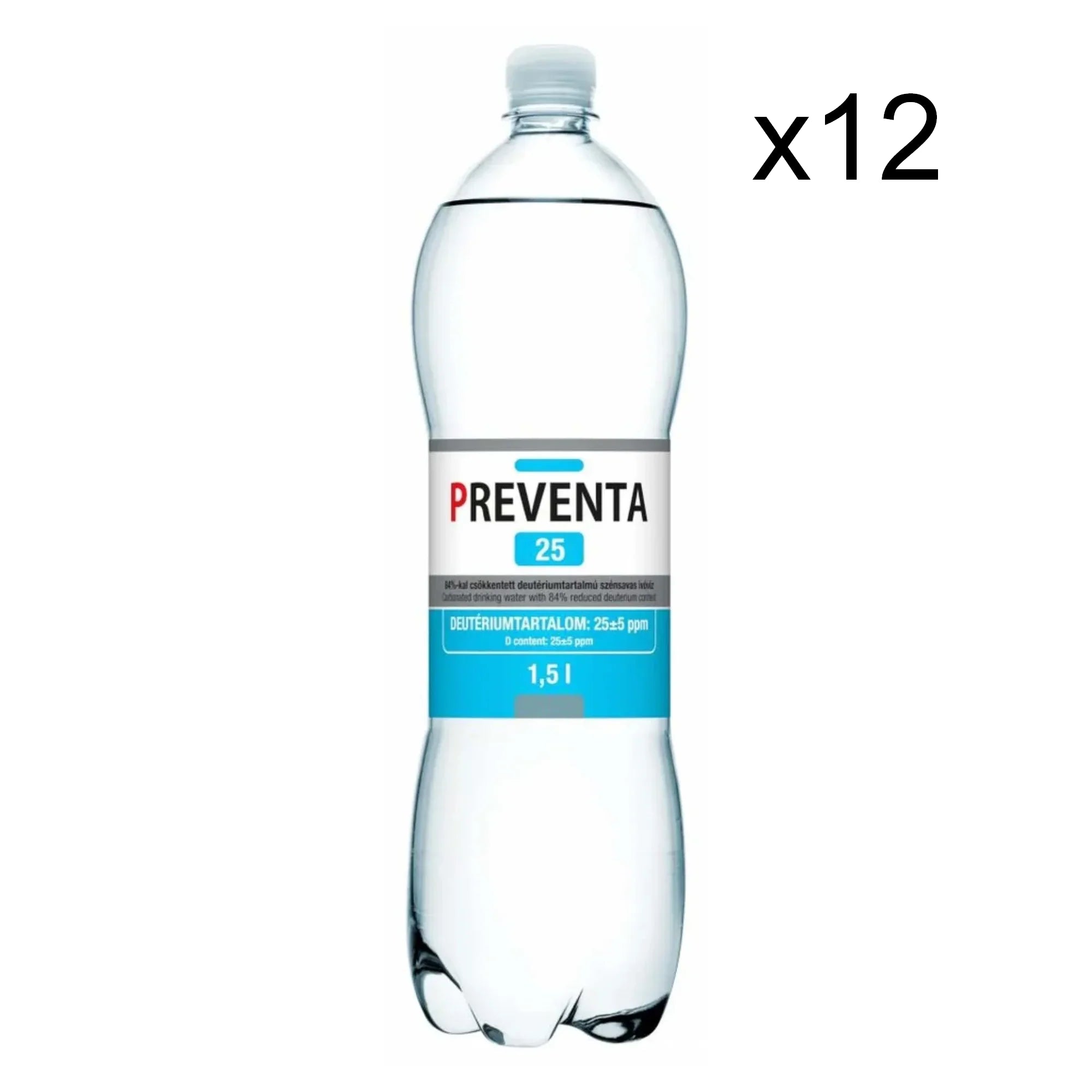
Deuterium-depleted water - Preventa® 25 - Carbonated (12 x 1,5 liter)
- Preventa®
- Deuterium-depleted water
- 12 x 1.5 liters
Deuterium-depleted water - Preventa® 25 from HYD LLC
Preventa® 25 contains twelve 1.5-liter bottles of Preventa® low-deuterium drinking water at 25 ppm. Deuterium is found in food, water, and air. The amount of deuterium is indicated in parts per million (ppm). Water with a concentration of less than 140 ppm is considered low in deuterium.
This product includes 12 bottles of 1,5 liters. Extra shipping costs are due for deliveries outside of the Benelux.
Heavy hydrogen
Deuterium is also known as heavy hydrogen. It is a naturally occurring, stable variant of ordinary hydrogen. The hydrogen nucleus consists of one proton, while the deuterium nucleus contains one proton and one neutron. This mass difference, however, causes significant differences between the physical and biochemical properties of hydrogen and deuterium, and therefore also in the body. An excess of deuterium in the body is undesirable. In Western populations, the deuterium load is so high that this is a major concern.
Benefits
- Patented production method
- Produced according to strict pharmaceutical guidelines
- Deuterium content 25 ppm, from natural spring water
- Lowers deuterium concentrations within the body
- May be used daily
- Very well documented
Why Preventa deuterium-deleted drinking water?
Lowering deuterium levels in tissues and organs is a natural biological process that occurs in our bodies. However, the body's ability to reduce deuterium levels decreases as we age, exercise less, and experience less sunlight. This ability can also be reduced under other circumstances. By reducing the deuterium content of drinking water below its natural level through the use of Preventa®, deuterium levels in the body can still be kept low, even if the body can no longer effectively reduce them on its own.
The difference between deuterium and hydrogen
Deuterium contains an extra neutron, doubling its mass compared to ordinary hydrogen. As happens in water, an excess of deuterium changes the chemistry of the "ingredients" that make up our bodies. Hydrogen and deuterium are integrated throughout the body into our cells, tissues, and fluids. The effects of deuterium's extra mass cause chemical reactions to differ from those of hydrogen. This has various metabolic consequences.
Light versus heavy water
Deuterium-depleted water is also called light water, compared to heavy water, which has different properties. Heavy water, or deuterium-rich water, consists of water molecules with two deuterium atoms instead of the usual hydrogen atoms. This makes it over ten percent heavier. It is used in some nuclear reactors to slow down neutrons.
Deuterium, a key player
Deuterium is found in the air, food, and water. The amount of deuterium is expressed in parts per million (ppm). Despite these seemingly small amounts, deuterium levels influence bodily functions. For comparison, our blood contains six times as much deuterium as calcium and ten times as much deuterium as magnesium. Although calcium and magnesium are present in lower concentrations in the blood than deuterium, their health effects are well-known and documented. Knowing that biological systems contain high concentrations of water makes it difficult to ignore the relative deuterium levels. They are therefore an important consideration when it comes to vitality.
Deuterium depletion with Preventa®
As mentioned, lowering deuterium levels is a natural biochemical process and is part of a cell's normal functions. However, as we age or under certain circumstances, this ability diminishes. If the body is no longer able to effectively excrete deuterium, consuming deuterium-depleted drinking water can reduce the total amount of deuterium in the body. Therefore, deuterium-depleted drinking water is part of a conscious and vital lifestyle. A general goal is to achieve a deuterium concentration of 130 ppm.
Preventa® deuterium-depleted water
Preventa deuterium-depleted drinking water is the most documented deuterium-depleted drinking water in the world. It is also the only deuterium-depleted water produced from natural spring water, according to strict pharmaceutical guidelines. This makes the product safe, certified, and contains exactly what is stated on the bottle. Preventa® deuterium-depleted drinking water is available in various deuterium concentrations, from 25 ppm to 125 ppm. Natural water contains deuterium with an average of around 150 ppm. Water with a concentration of less than 140 ppm is considered deuterium-depleted. Preventa® products with different concentrations can be used in various protocols. Preventa® deuterium-depleted drinking water can be used as a replacement for normal daily fluid intake.
Deuterium in the mitochondria
The mitochondria in cells play a central role in energy metabolism. A healthy energy metabolism is essential for overall vitality. Each mitochondrion contains hundreds of nanomotors that extract energy from food. Hydrogen ions power these nanomotors, which together ensure ATP synthesis. As a hydrogen variant, deuterium also has a negative effect on the nanomotors. This creates an imbalance between energy supply and demand. In this context, Preventa® low-deuterium drinking water is also an interesting option.
About HYD LLC and Preventa®
Preventa® is an international trademark owned by HYD LLC in Hungary. In 2005, Preventa® deuterium-depleted drinking water was launched at the largest food trade fair, ANUGA. The product immediately won first prize in the international innovation competition "New Foods" at the Health & Functional Food Forum in Cologne. In 1999, HYD LLC received a license to produce deuterium-depleted drinking water from various health institutions in Budapest. The production of Preventa® deuterium-depleted drinking water follows a proprietary process. HYD LLC produces and distributes various deuterium-depleted products with deuterium levels between 125 and 25 ppm. The effects of Preventa® deuterium-depleted drinking water on the body have been thoroughly researched and documented by HYD LLC.
Choose options

